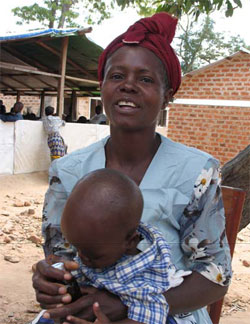Tanzania, host to the largest refugee population on the African continent, loses 80,000 children under five every year to malaria.

Nyasa Tunga with her youngest boy, Ekyoci, who was treated and cured of malaria. Source: Kim Wylie/USAID
Tanzania, host to the largest refugee population on the African continent, loses 80,000 children under five every year to malaria. Nyasa, who is a mother of seven children, ranging in age from eight months to 15 years, periodically nursed her youngest baby boy, Ekyoci, as she explained how he became ill recently with fever, cough, shivers, and rapid breathing. She brought Ekyoci to the camp’s health dispensary where he was given a Rapid Diagnostic Test. Within 15 minutes, the test results were definitive – Ekyoci had malaria.
Prior to 2007, Tanzanian health providers, including those in the refugee camps, treated malaria with drugs that have become increasingly powerless against the disease. To address drug resistance, the Government of Tanzanian began distributing Coartem – a new and highly effective drug – on the mainland in December 2006. Since then, Coartem has become the national medicine of choice to treat malaria. Known on the mainland as “Alu,” Coartem is actually a combination of two medicines – Artemether and Lumefantrine – that when taken together and correctly, provide nearly immediate and complete recovery from malaria.
Asked how she was coping with life in the refugee camp, Nyasa shifted the baby on her lap and admitted, “Life can be difficult. But I’m here for my children’s education.
Through USAID/Tanzania, PMI has provided more than $500,000 to the United Nations for refugee camps in Tanzania, enough to treat nearly 300,000 people from this terrible disease, and PMI will continue to support the purchase of Coartem in the refugee camps in Tanzania in 2007.
